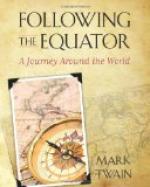One of Kipling’s ballads has delivered the aspect and sentiment of this bewitching sea correctly:
“The
Injian Ocean sets an’ smiles
So
sof’, so bright, so bloomin’ blue;
There
aren’t a wave for miles an’ miles
Excep’
the jiggle from the screw.”
April 14. It turns out that the astronomical apprentice worked off a section of the Milky Way on me for the Magellan Clouds. A man of more experience in the business showed one of them to me last night. It was small and faint and delicate, and looked like the ghost of a bunch of white smoke left floating in the sky by an exploded bombshell.
Wednesday, April 15. Mauritius. Arrived and anchored off Port Louis 2 A. M. Rugged clusters of crags and peaks, green to their summits; from their bases to the sea a green plain with just tilt enough to it to make the water drain off. I believe it is in 56 E. and 22 S.—a hot tropical country. The green plain has an inviting look; has scattering dwellings nestling among the greenery. Scene of the sentimental adventure of Paul and Virginia.
Island under French control—which means a community which depends upon quarantines, not sanitation, for its health.
Thursday, April 16. Went ashore in the forenoon at Port Louis, a little town, but with the largest variety of nationalities and complexions we have encountered yet. French, English, Chinese, Arabs, Africans with wool, blacks with straight hair, East Indians, half-whites, quadroons —and great varieties in costumes and colors.
Took the train for Curepipe at 1.30—two hours’ run, gradually uphill. What a contrast, this frantic luxuriance of vegetation, with the arid plains of India; these architecturally picturesque crags and knobs and miniature mountains, with the monotony of the Indian dead-levels.
A native pointed out a handsome swarthy man of grave and dignified bearing, and said in an awed tone, “That is so-and-so; has held office of one sort or another under this government for 37 years—he is known all over this whole island and in the other countries of the world perhaps —who knows? One thing is certain; you can speak his name anywhere in this whole island, and you will find not one grown person that has not heard it. It is a wonderful thing to be so celebrated; yet look at him; it makes no change in him; he does not even seem to know it.”
Curepipe (means Pincushion or Pegtown, probably). Sixteen miles (two hours) by rail from Port Louis. At each end of every roof and on the apex of every dormer window a wooden peg two feet high stands up; in some cases its top is blunt, in others the peg is sharp and looks like a toothpick. The passion for this humble ornament is universal.
Apparently, there has been only one prominent event in the history of Mauritius, and that one didn’t happen. I refer to the romantic sojourn of Paul and Virginia here. It was that story that made Mauritius known to the world, made the name familiar to everybody, the geographical position of it to nobody.




